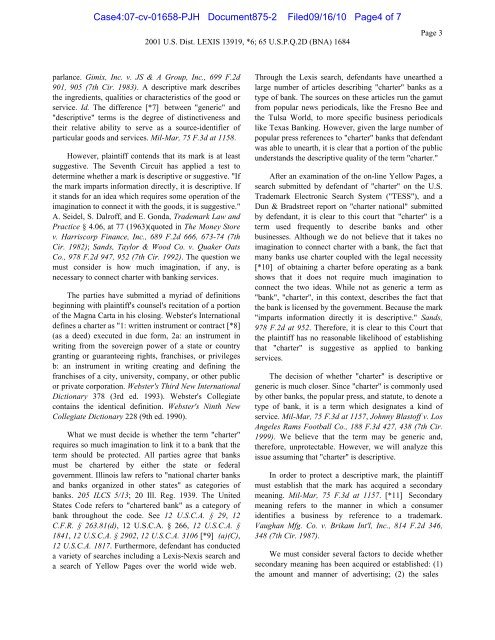exhibit 2 - SAP Lawsuit Portal
exhibit 2 - SAP Lawsuit Portal
exhibit 2 - SAP Lawsuit Portal
Create successful ePaper yourself
Turn your PDF publications into a flip-book with our unique Google optimized e-Paper software.
Case4:07-cv-01658-PJH Document875-2 Filed09/16/10 Page4 of 7<br />
2001 U.S. Dist. LEXIS 13919, *6; 65 U.S.P.Q.2D (BNA) 1684<br />
parlance. Gimix, Inc. v. JS & A Group, Inc., 699 F.2d<br />
901, 905 (7th Cir. 1983). A descriptive mark describes<br />
the ingredients, qualities or characteristics of the good or<br />
service. Id. The difference [*7] between "generic" and<br />
"descriptive" terms is the degree of distinctiveness and<br />
their relative ability to serve as a source-identifier of<br />
particular goods and services. Mil-Mar, 75 F.3d at 1158.<br />
However, plaintiff contends that its mark is at least<br />
suggestive. The Seventh Circuit has applied a test to<br />
determine whether a mark is descriptive or suggestive. "If<br />
the mark imparts information directly, it is descriptive. If<br />
it stands for an idea which requires some operation of the<br />
imagination to connect it with the goods, it is suggestive."<br />
A. Seidel, S. Dalroff, and E. Gonda, Trademark Law and<br />
Practice § 4.06, at 77 (1963)(quoted in The Money Store<br />
v. Harriscorp Finance, Inc., 689 F.2d 666, 673-74 (7th<br />
Cir. 1982); Sands, Taylor & Wood Co. v. Quaker Oats<br />
Co., 978 F.2d 947, 952 (7th Cir. 1992). The question we<br />
must consider is how much imagination, if any, is<br />
necessary to connect charter with banking services.<br />
The parties have submitted a myriad of definitions<br />
beginning with plaintiff's counsel's recitation of a portion<br />
of the Magna Carta in his closing. Webster's International<br />
defines a charter as "1: written instrument or contract [*8]<br />
(as a deed) executed in due form, 2a: an instrument in<br />
writing from the sovereign power of a state or country<br />
granting or guaranteeing rights, franchises, or privileges<br />
b: an instrument in writing creating and defining the<br />
franchises of a city, university, company, or other public<br />
or private corporation. Webster's Third New International<br />
Dictionary 378 (3rd ed. 1993). Webster's Collegiate<br />
contains the identical definition. Webster's Ninth New<br />
Collegiate Dictionary 228 (9th ed. 1990).<br />
What we must decide is whether the term "charter"<br />
requires so much imagination to link it to a bank that the<br />
term should be protected. All parties agree that banks<br />
must be chartered by either the state or federal<br />
government. Illinois law refers to "national charter banks<br />
and banks organized in other states" as categories of<br />
banks. 205 ILCS 5/13; 20 Ill. Reg. 1939. The United<br />
States Code refers to "chartered bank" as a category of<br />
bank throughout the code. See 12 U.S.C.A. § 29, 12<br />
C.F.R. § 263.81(d), 12 U.S.C.A. § 266, 12 U.S.C.A. §<br />
1841, 12 U.S.C.A. § 2902, 12 U.S.C.A. 3106 [*9] (a)(C),<br />
12 U.S.C.A. 1817. Furthermore, defendant has conducted<br />
a variety of searches including a Lexis-Nexis search and<br />
a search of Yellow Pages over the world wide web.<br />
Page 3<br />
Through the Lexis search, defendants have unearthed a<br />
large number of articles describing "charter" banks as a<br />
type of bank. The sources on these articles run the gamut<br />
from popular news periodicals, like the Fresno Bee and<br />
the Tulsa World, to more specific business periodicals<br />
like Texas Banking. However, given the large number of<br />
popular press references to "charter" banks that defendant<br />
was able to unearth, it is clear that a portion of the public<br />
understands the descriptive quality of the term "charter."<br />
After an examination of the on-line Yellow Pages, a<br />
search submitted by defendant of "charter" on the U.S.<br />
Trademark Electronic Search System ("TESS"), and a<br />
Dun & Bradstreet report on "charter national" submitted<br />
by defendant, it is clear to this court that "charter" is a<br />
term used frequently to describe banks and other<br />
businesses. Although we do not believe that it takes no<br />
imagination to connect charter with a bank, the fact that<br />
many banks use charter coupled with the legal necessity<br />
[*10] of obtaining a charter before operating as a bank<br />
shows that it does not require much imagination to<br />
connect the two ideas. While not as generic a term as<br />
"bank", "charter", in this context, describes the fact that<br />
the bank is licensed by the government. Because the mark<br />
"imparts information directly it is descriptive." Sands,<br />
978 F.2d at 952. Therefore, it is clear to this Court that<br />
the plaintiff has no reasonable likelihood of establishing<br />
that "charter" is suggestive as applied to banking<br />
services.<br />
The decision of whether "charter" is descriptive or<br />
generic is much closer. Since "charter" is commonly used<br />
by other banks, the popular press, and statute, to denote a<br />
type of bank, it is a term which designates a kind of<br />
service. Mil-Mar, 75 F.3d at 1157, Johnny Blastoff v. Los<br />
Angeles Rams Football Co., 188 F.3d 427, 438 (7th Cir.<br />
1999). We believe that the term may be generic and,<br />
therefore, unprotectable. However, we will analyze this<br />
issue assuming that "charter" is descriptive.<br />
In order to protect a descriptive mark, the plaintiff<br />
must establish that the mark has acquired a secondary<br />
meaning. Mil-Mar, 75 F.3d at 1157. [*11] Secondary<br />
meaning refers to the manner in which a consumer<br />
identifies a business by reference to a trademark.<br />
Vaughan Mfg. Co. v. Brikam Int'l, Inc., 814 F.2d 346,<br />
348 (7th Cir. 1987).<br />
We must consider several factors to decide whether<br />
secondary meaning has been acquired or established: (1)<br />
the amount and manner of advertising; (2) the sales


